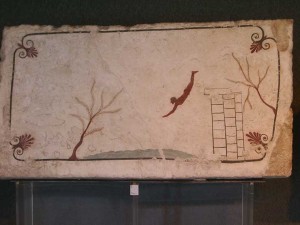A note of introduction from Dr. Maurer:
“Dear people, Taylor has just reminded me to send you this, that yesterday I said I’d send you, some pages from D. H. Lawrence’s book about the Etruscans (about their religion). It’s from his book called Etruscan Places; and if you like this, you can download the entire book from www.archive.org.
One word of warning. Like many self-educated people, Lawrence is ‘opinionated’ and intemperate; and he plays loose now and then with facts; and he has a fierce, childish, and stupid (though often very entertaining!) polemic against the Greeks and Romans — against whom he juxtaposes his beloved Etruscans. But one should never — the way I fear scholars often do — sneer at a writer just because he gets some big things wrong! In my opinion almost ALL that he says here about Etruscan religion is true ALSO of Greek and of Roman religion — even though he appears to be quite blind to this fact. And it’s often penetrating, and often even true and beautiful. I think it can help one understand Vergil, and Homer, and very many other ancient things (and also, of course, ourselves).
I’ve had no time to proofread these pages — so beware of OCR errors.”
And an excerpt from a letter I once wrote to a friend:
I don’t doubt that you’ll take great delight in these descriptions of Etruscan places, especially since we never had the chance to see these sorts of things within Veritas’ curriculum.
Lewis’ entire Perelandra is dipped in the very same imagery, and I’m sure you will enjoy how, when D.H. Lawrence’s “cosmological vitality” is coupled with monotheism, the picture becomes all the more vivid–not less, as Lawrence suggests.
If I had the pleasure of meeting with you at our incredibly protean philosophy club, we would doubtless have great conversations about everything Lawrence seems to love here. I would mention, as proof for truly living monotheism, St. Francis’ “Canticle of the Sun,” I would recall that wonderful moment in Perelandra when the two gods are present to Ransom (It’s time to read that book again!), and somewhere along the way, one of us would meet anew some old word and rejoice in it.
“Most high, all powerful, all good Lord! All praise is yours, all glory, all honor, and all blessing. To you, alone, Most High, do they belong. No mortal lips are worthy to pronounce your name.
Be praised, my Lord, through all your creatures, especially through my lord Brother Sun, who brings the day; and you give light through him. And he is beautiful and radiant in all his splendor! Of you, Most High, he bears the likeness.
Be praised, my Lord, through Sister Moon and the stars; in the heavens you have made them, precious and beautiful.
Be praised, my Lord, through Brothers Wind and Air,
and clouds and storms, and all the weather, through which you give your creatures sustenance.
Be praised, My Lord, through Sister Water; she is very useful, and humble, and precious, and pure.
Be praised, my Lord, through Brother Fire, through whom you brighten the night. He is beautiful and cheerful, and powerful and strong.
Be praised, my Lord, through our sister Mother Earth, who feeds us and rules us, and produces various fruits with colored flowers and herbs.
Be praised, my Lord, through those who forgive for love of you; through those who endure sickness and trial. Happy those who endure in peace, for by you, Most High, they will be crowned.
Be praised, my Lord, through our Sister Bodily Death, from whose embrace no living person can escape. Woe to those who die in mortal sin! Happy those she finds doing your most holy will. The second death can do no harm to them.”
Praise and bless my Lord, and give thanks, and serve him with great humility.



I forgot how much I enjoy reading D.H. Lawrence’s prose!
“To the Etruscan all was alive; the whole universe lived; and the business of man was himself to live amid it all. He had to draw life into himself, out of the wandering huge vitalities of the world. The cosmos was alive, like a vast creature. The whole thing breathed and stirred.”